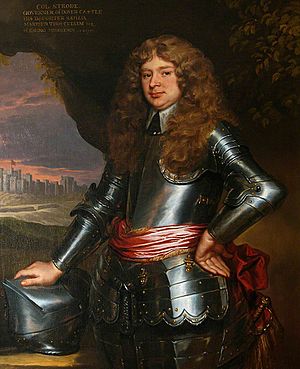John Strode (died 1679) facts for kids
Quick facts for kids
Sir John Strode
|
|
|---|---|

Portrait by John Hayls, c.1679
|
|
| Born | 11 August 1624 |
| Died | 1679 (aged 54–55) |
| Nationality | English |
| Spouse(s) |
|
| Children | William Strode John Strode Thomas Strode George Strode Robert Strode Anne Strode Margaret Strode Hugh Strode Browne Strode Elizabeth Strode |
| Parent(s) | Sir John Strode Ann Wyndham |
Sir John Strode (born August 11, 1624 – died 1679) was an important English gentleman from Parnham, Dorset. He lived during a very exciting time in England's history. Sir John supported the King's side, known as the Royalists, during the English Civil War. This was a big fight between the King and Parliament. Later, he worked in government during a period called the Protectorate, when Oliver Cromwell was in charge. Cromwell even made him a knight! After the King returned to power in a time called the Restoration, Sir John became a member of Parliament. King Charles II also made him a knight in 1662.
Contents
Sir John Strode's Life and Work
Sir John Strode was the son of Sir John Strode, who was also a Royalist. His father was a Member of Parliament (MP) for Bridport. Sir John's mother was Ann Wyndham. Sadly, his mother was killed in 1645 by soldiers who supported Parliament.
Early Life and the Civil War
Sir John received a private education. When his father passed away in 1642, John took over the family estate. During the English Civil War, he was a commissioner for the Royalist side. This meant he helped manage things for the King's supporters. After the war, he had to pay a fine to keep his estate because he had supported the losing side.
Working for the Government
In 1652, Sir John became a commissioner for assessment, helping to collect taxes. He was also appointed a J.P. (Justice of the Peace) for Dorset. A J.P. is someone who helps keep law and order. However, he was removed from these roles soon after.
By 1657, he was back as a commissioner for assessment. He also served as the Sheriff of Dorset from 1657 until November 1660. The Sheriff was a very important local official. In 1658, Oliver Cromwell, who was then the Lord Protector (the leader of England), made Sir John a knight.
After the King Returned
From January 1660 until his death, Sir John continued to be a commissioner for assessment. In May 1660, he became a freeman of Lyme Regis. This meant he had special rights in the town. In July 1660, he was again appointed a J.P. for Dorset, a role he held until he died.
In 1661, the people of Dorset elected him to be their Member of Parliament. He served in the Cavalier Parliament, which was the first Parliament after King Charles II returned to the throne. The King himself made Sir John a knight in April or May 1662.
Sir John also became a freeman of Poole in 1662. He was a commissioner for corporations from 1662 to 1663. From 1663 until his death, he was a Deputy Lieutenant. This was another important local government role. In 1665, he helped with pressing seamen, which meant finding people to serve in the navy. In 1675, he was a commissioner for recusants. Sir John passed away in 1679 when he was about 55 years old.
Sir John Strode's Family Life
Sir John Strode was married twice and had many children.
First Marriage
On December 13, 1646, Sir John married Anne Hewett. She was the daughter of Sir William Hewett from Pishiobury, Sawbridgeworth, Hertfordshire. Together, they had six sons and two daughters:
- William Strode
- John Strode
- Thomas Strode
- George Strode
- Robert Strode
- Anne Strode
- Margaret Strode
Second Marriage
Sir John married for the second time on November 23, 1669. His second wife was Lady Anne Poulett. She was the widow of John Poulett, 2nd Baron Poulett. Lady Anne was also the daughter of Sir Thomas Browne, 2nd Baronet of Walcot. With Lady Anne, Sir John had two more sons and one daughter:
- Hugh Strode
- Browne Strode
- Elizabeth Strode, who married Sir William Oglander 3rd Baronet in 1699. He was from Nunwell House on the Isle of Wight.
 | Chris Smalls |
 | Fred Hampton |
 | Ralph Abernathy |

